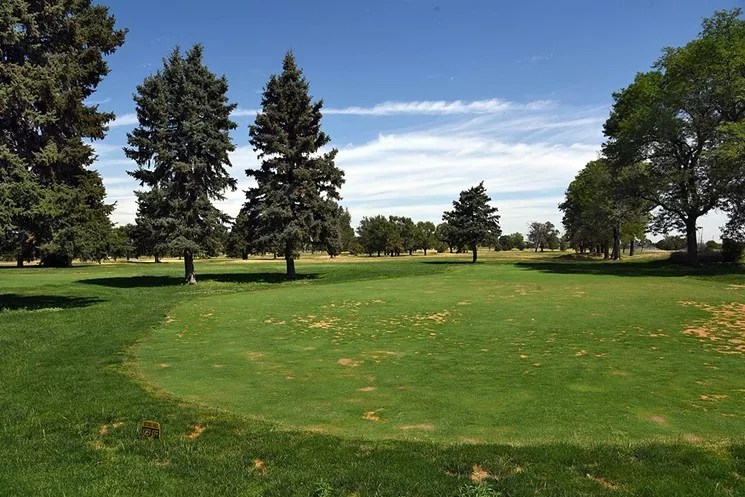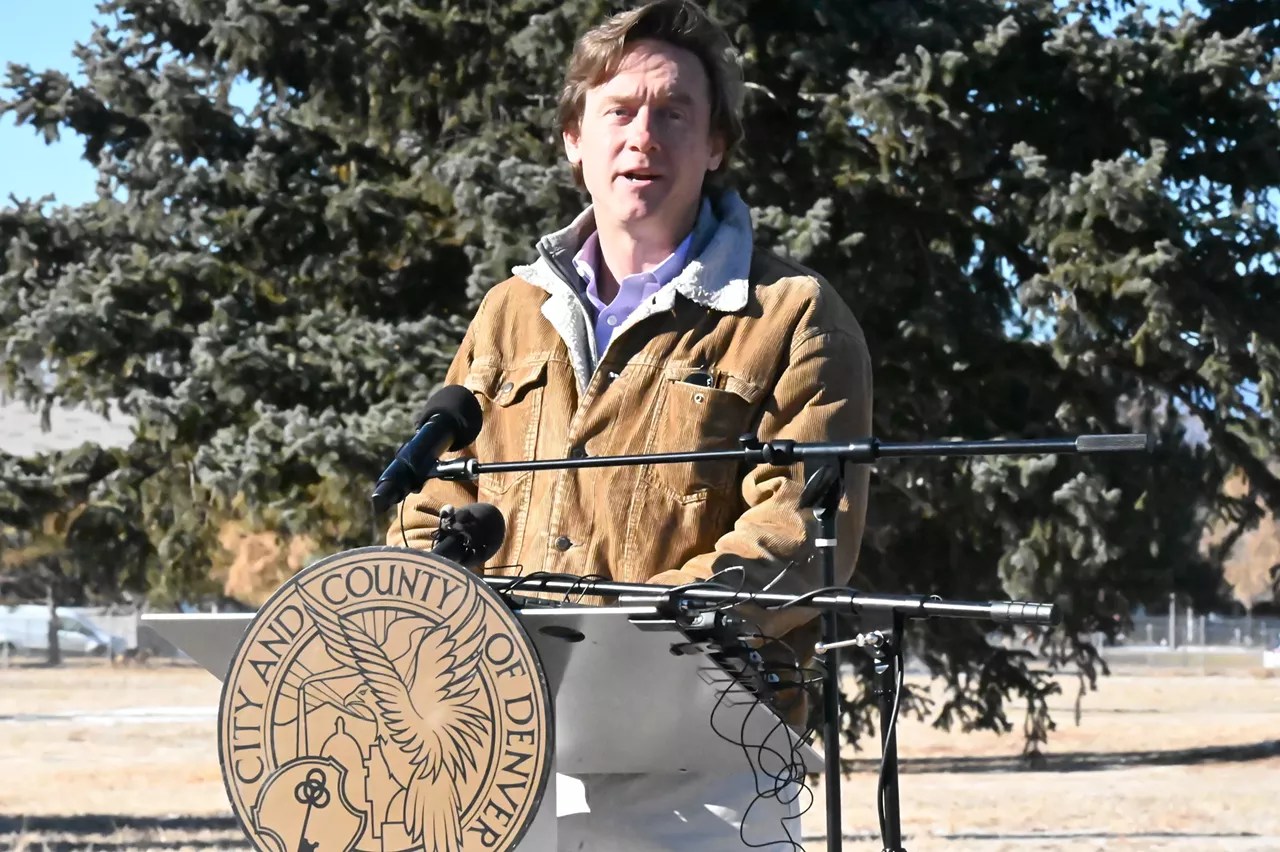
Anthony Camera

Audio By Carbonatix
Denver Mayor Mike Johnston has made a deal for the city to acquire the defunct, 155-acre Park Hill Golf Course from developers, he announced on Wednesday, January 15. Once Denver City Council and the Adams County Board of Commissioners approve the deal, Johnston plans to turn the land into a public park that is expected to open this summer, the mayor said.
“We believe Park Hill can be a crown jewel of Denver,” Johnston said at a press event. “This is an incredible opportunity to remake a space that has been neglected and unused for far too long. Together we can make this the go-to destination for runners, readers, cyclists, picnickers, birdwatchers and, of course, children and families. This site will be all of Denver’s to cherish for generations to come.”
Johnston struck a deal with the land’s current owners, Westside Investment Partners, by giving the firm 145 acres of land that the city owns near Denver International Airport in Adams County in exchange for the golf course located at the corner of West 35th Avenue and Colorado Boulevard in Northeast Park Hill. The land hasn’t been used as a golf course since 2018, when the previous owners, Clayton Early Learning, shut it down because of high costs and low revenues.
In a press release, the city promised “a modern, urban park,” but first it will create an open-space area equipped with a dog park, picnic tables, walking trails and a disc golf course. The city will first fix the golf course’s “immediate issues, such as broken walkways and overgrown trees and brush,” according to the press release. “Fencing will remain, though entrance ways will be created.”
Although the new open-space features in Park Hill are expected to be open by this summer, other park amenities are expected to take more time, according to the mayor’s office.
The new park will be the largest addition of private land to the city’s park system in more than 100 years, Johnston said on Wednesday. It will be the city’s fourth-largest park, behind City Park, Sloan’s Lake and (by ten acres) Washington Park, according to the press release. Denver Parks & Recreation will oversee the land and park transition, while the mayor’s office will collect public input ahead of its opening to find out what features residents will want in the park, Johnston said.
“We are very excited about the process for our community to be able to have input and say about how we turn this space into use for a public park,” the mayor added. “It is because of community members who raised their voice over and over to say ‘We want this space to be open to all of us, here for all of us and home to all of us’ that we are here today.”
Westside hasn’t been able to do much with the 155-acre golf course since purchasing it in 2019. The company has been stymied by an agreement between Clayton and former mayor Wellington Webb that came in 1997.
On Wednesday, Webb said, “When we put the easement on, I never knew how much controversy it would have later in life.” The conservation easement would frustrate Westside and keep it from developing the land, but Webb said the city needed the agreement to preserve the land.
“This is the last 155 acres of space that we have here in Denver,” Webb said. “It has to be maintained, and it has to be under city control.”
Webb applauded “the landmark legislation that Mayor Johnston has achieved in getting this land back. He followed through on his word, which is very important, and now it’s up to city council.”

Denver Mayor Mike Johnston agreed to a land swap to acquire the defunct, 155-acre Park Hill Golf Course from developers, with plans to turn the land into a public park.
Bennito L. Kelty
History of Denver’s Park Hill Golf Course
Formerly a dairy farm, the 155-acre property near Colorado Boulevard and East 35th Avenue in northeast Denver opened as a golf course in 1932. It was part of the trust of George W. Clayton, a businessman and civic leader who left money for the creation of Clayton Early Learning, a school for low-income students. In 1985, Clayton Early Learning took control of the golf course and began leasing it out to Arcis Golf. It kept its status as one of Denver’s oldest golf courses until closing in 2018.
In 1997, former mayor Wellington Webb struck a deal with Clayton Early Learning that would haunt everyone decades later: The City of Denver paid Clayton $2 million to accept a conservation easement, or legal agreement to limit the land to being used only as an eighteen-hole golf course.
Revenue declined, and costs to operate the golf course increased for Clayton Early Learning. In August 2017, then-Mayor Michael Hancock proposed buying the golf course from the Clayton Trust for $10 million. The city and Clayton worked on a complicated deal that would have allowed Denver to buy the land and develop half of it in compliance with the conservation easement. However, Arcis then sued Clayton to maintain its right to buy the property, which put the deal on hold.
In November 2017, Clayton pulled out of the deal, citing its disagreement with Arcis. In 2018, Clayton shuttered the golf course while it tried to sell the property.
In July 2019, Clayton Early Learning successfully sold the golf course for $24 million to the developer Westside Investment Partners. The deal outraged open-space activists, including Webb, who told Westword at the time that he didn’t want to see it become “a paved paradise.” But Westside didn’t initiate development at the time, as questions lingered about what could be done with the conservation easement in place.
Developers thought that lifting the conservation easement would be as easy as working out a new deal with the city, but open-space activists began making noise in October 2019, citing state statute that requires developers to go to court to undo the agreement.
In October 2020, Westside and the city kicked off a planning process anyway, though it focused on only developing a small area of the golf course. But the conservation easement continued to keep Westside from moving forward with any plans.
Westside project managers said that a golf course was not an appropriate use of the land, but open-space advocates continued to push against the construction of housing, shopping or restaurants, among other ideas. Along with the conservation easement, Denver residents’ criticisms would ultimately keep Westside from making any headway in 2021.
By June 2021, open-space advocates were pushing a city ballot initiative that would prevent Westside from developing the site, while Westside was funding a ballot initiative to exempt the property from those restrictions. Advocates were able to get the Yes for Parks and Open Space initiative on the November 2021 ballot, while Westside got a dueling initiative on the ballot after spending $250,000 to campaign for the measure.
Voters approved the open-space measure and rejected the Westside development measure. The company tried different plans, and in October 2022 proposed turning the golf course into Denver’s fourth-largest urban park. In June 2023, Denver City Council approved the plan and sent a measure to the ballot for a 2023 city election that would lift the conservation easement for Westside and allow it to follow through on its development plan.
Measure 2O, as the initiative was known, failed in April 2023, with nearly two-thirds of votes being cast against it. Westside hasn’t done anything with the property since other than hire security to keep people out of the golf course.